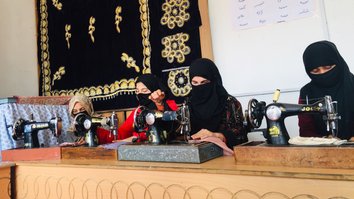JALALABAD -- The Nangarhar government is seeking to provide more jobs for women as their enthusiasm to work in government continues to rise, officials say.
"In the past, during the era of the Taliban, there were no educational opportunities for women," Fatana Aziz, director of the department of Women's Affairs of Nangarhar, told Salaam Times.
"When that system collapsed and democracy came, women became educated, they studied at universities and most of them studied up to the master's level. For this reason, jobs for women have increased and women work beside men in every department," Aziz said.
To allow more women access to work postings, female candidates now receive preferential attention as the government seeks a more open job-recruitment process, she said.
"We have succeeded in providing women with jobs and not just with education," said Aziz. "But this work can't be done all at once. We will be going ahead slowly, and then we will accelerate our struggle."
About 16% of government employees in Nangarhar are female, according to Nangarhar Governor Shah Mahmood Miakhil.
Of the total, "10% are working in the department of education as principals, teachers and in other positions, while the other 6% work in other government departments," Miakhil said at a March 10 ceremony to celebrate International Women's Day (March 8) in Jalalabad.
"We have decided to increase this percentage. I have advised all government departments to give more consideration to females when they are recruiting," he said.
Challenges remain
Habiba Kakar, Nangarhar's deputy provincial governor, has been in her position for a year and understands the challenges faced by women in the workplace.
"At the beginning, it was difficult for me when I came to this position," she told Salaam Times. "People were saying, 'You are a woman; what will happen?' But later I got used to it, and I did not have any difficulty at work."
"When I became a candidate for this position, I wanted to work for women and serve them," she added. "Now I do a lot of work for them because women face many difficulties and we have to reach out to them. I help them out in all sectors."
"I am a women's rights activist," she said. "I want to do more work for women."
Kayenat, a resident of Surkh Rod District, teaches in Surkh Rod's central girls' school. She emphasised the value of a good education in finding jobs.
"After graduating from university, I looked for a job," she told Salaam Times. "I did that for a couple of months, but later I applied to be a teacher."
"I started out as a contract teacher, and then I became an official teacher. Now my life is good. I am happy," she said. "I am educating a new generation, and most of my female students, if Allah is willing, will attend university" and find work also, she said.
"Each family should send its daughters, sisters and granddaughters to school," Kayenat added. "Later, they may send them to university and if they can, let them study for a master's and a Ph.D in order to be able to compete in the world."

![Deputy Governor of Nangarhar Province Habiba Kakar welcomes a group of surrendering militants at the National Directorate of Security provincial compound in Jalalabad on January 30. [Nangarhar provincial governor's press office/Facebook]](/cnmi_st/images/2019/04/03/17453-habiba-585_329.jpg)






